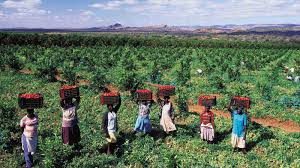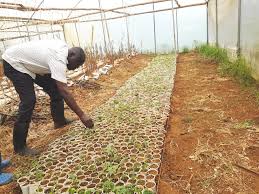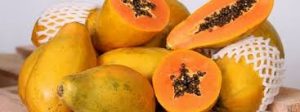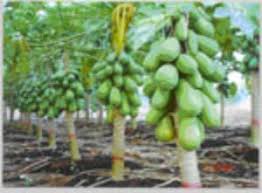HOW TO START A PAPAYA/PAWPAW FARMING SUCCESSFUL NOW?


Papaya (pawpaws) have a creamy, custard – like flesh with a complex combination of tropical fruit flavors. They are most commonly described as tasting like banana combined with mango, pineapple, melon, berries, or other fruit. There is a considerable variety of flavors among wild pawpaws, ranging from awful to sublime.
SOIL
Pawpaw (papaya) need a light, well-drained soil. They are easily killed by excess moisture. The soils need to be moist in hot weather and dry oin cold weather. Pawpaws do not tolerate salty water or soil. While doing best in light, porous soils rich in organic matter, the plant will grow in scarified limestone, marl, or various other soils if it is given adequate care. Optimum pH ranges from 5.5 to 6.7. On rich organic soils the pawpaw makes lush growth and bears heavily but the fruit are of low quality. It is recommended that no herbicides are used due to the little woodyness of the paw paw tree stem which may end up damaged.
SEEDS
Seeds may be planted directly in the field, or seedlings raised in beds or pots may be transplanted when 6 weeks old or even up to 6 months of age, though there must be great care in the handling process. The longer the delay the greater the risk of dehydrated or twisted roots; also, transplanting often results in trunk-curvature in windy locations.
PLANTING
The pawpaw/papaya is a tropical and near – tropical species, very sensitive to frost and limited to the region between 32° north and 32° south of the equator. It needs plentiful rainfall or irrigation but must have good drainage. Flooding for 48 hours is fatal.

FERTILIZATION
The fast – growing pawpaw requires regular applications of nitrogen fertilizers but the exact rates have not been established. Feed monthly and adjust according to the plant’s response. They can take fairly hot organic fertilizing such as chicken manure if used with deep irrigation after warm weather has started.
POLLINATION
If a pawpaw plant is inadequately pollinated, it will bear a light crop of fruits lacking uniformity in size and shape. Therefore, hand – pollination is advisable in commercial plantations that are not entirely bisexual. Bags are tied over bisexual blossoms for several days to ensure that they are self- pollinated. The progeny of self-pollinated bisexual flowers are 67% bisexual, the rest being female.
Fruit farming is a profitable business that has evolved over the years from small scale – backyard gardens to a global industry in all countries where it’s carried out. If you want to start your own successful farming operation and create some jobs for people, the best way is to start with a proper and well-structured business plan.
NEED ANY HELP OR PROFESSIONAL GUIDANCE IN ANY FARMING AREA CONTACT US NOW AT : (27)84 583 3143 or Email: money@global.co.za


HOW TO START A PAPAYA/PAWPAW FARMING SUCCESSFUL NOW? Read More »